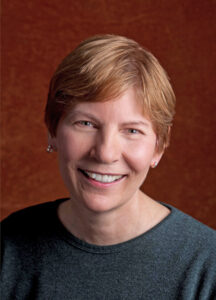By Kathy Berken

Many years ago after an exhausting retreat, some of us went out to dinner. Tired and hungry, I focused on my food. The man next to me was talking. I kept eating. He stopped and scolded me: “You aren’t listening to me!” I was mortified.
A few weeks ago on that fateful Monday night from football hell, fans everywhere screamed about replacement refs making the worst call ever. Their voices demanded a listening ear.
Arguments rage endlessly about which candidate will do the best job. We jump on our soapbox and shout over each other’s rants. Can anybody hear me now?! Are we really listening to each other?
On her final show, Oprah Winfrey said that in her 25 years on the air everyone she met had this in common: “They all wanted validation. They want to know: ‘Do you see me? Do you hear me? Does what I say mean anything to you?”
As a spiritual director in training, I’m re-learning how to listen. It’s a skill I practice because it’s easy to fall into a well-meaning empathetic mode. “You had a house fire? Yeah, me too. It was horrible. Let me tell you about it.” All good intentions aside, the focus just shifted from the speaker to me. I used to think finding something in common helped the speaker not feel alone. That’s not listening, that’s telling competing stories.
Once in a grocery store, the cashier and the person ahead of me in line were arguing. When it was my turn, not wanting to encounter her wrath, I carefully muttered, “Having a bad day today, huh?” Her eyes began to fill with tears. I had no idea the impact of my comment. She took a deep breath and explained her horrible day, her little boy was home sick, and then she apologized for dumping on me. I said, “Oh, that’s okay. You deal with a lot here.”
Spiritual writer Parker Palmer says that one of the hardest things to do is to be present to another in pain without trying to fix their problems. It’s best “to simply stand respectfully at the edge of that person’s mystery and misery (“Let Your Life Speak” 63). We may feel powerless to help, but fixing is not our role as listeners. Our deep listening validates their experience and helps them feel a truly human and spiritual connection.
Our very existence may depend on being heard, validated, accepted, and understood. Spiritual director Margaret Guenther calls this “holy listening” in her book by the same name. We don’t have the time or patience to listen, she says. “Or, perhaps, we lack courage to hear them.” Worse, she adds, “we dismiss those not ‘worth’ listening to” (143).
This anguish of worthlessness is what the Israelites felt when they were left to rot and die in Jerusalem after the Babylonian exile when they prayed to God and God did not save them. “Hear my plea, do not shut Your ear to my groan, to my cry!” (Lam. 3:55-56). They blamed God for destroying their city and then begged him to listen to their cries. God was silent. Imagine the hell of that.
The Paschal Mystery of Jesus’ dying, rising, and sending the Holy Spirit helps us continue God’s mission. We are God’s bodies on earth. Do we believe that we are temples of that Holy Spirit, or not?
When I sit with someone who pours out their heart and soul, the Spirit of God present to them resides inside of me — as in all of us — to hold their pain, to acknowledge their anguish, and to validate their experience. This is listening. And it is holy.
(Kathy Berken has a master’s degree in theology from St. Catherine University, St. Paul, Minn. She lived and worked at The Arch, L’Arche in Clinton (1999-2009) and is author of “Walking on a Rolling Deck: Life on the Ark (stories from The Arch).”)







